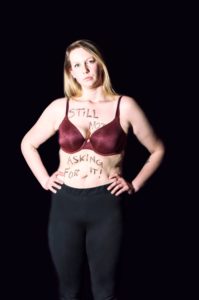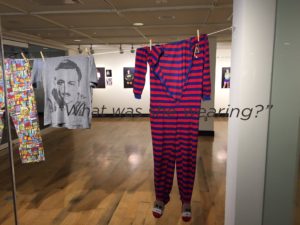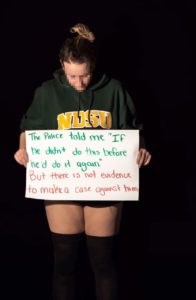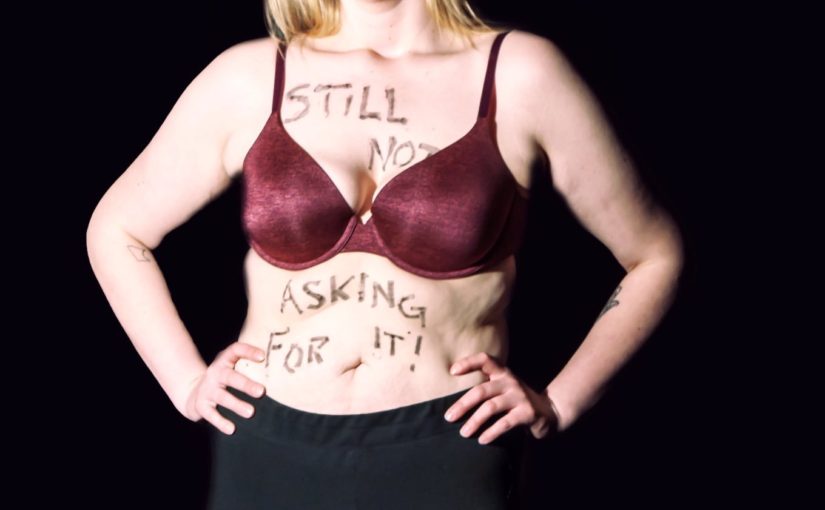
Mackenzie Eckman’s Clothesline Project seeks to bring awareness, peace and healing to sexual assault and those who are victims. While there are no men in the project, Eckman was clear that sexual assault affects many people.
Clothing can symbolize many things for a person. It can remind them of specific times in their lives. A football jersey from a winning Super Bowl or a special tie worn at a killer job interview can all be remembered years down the road.
However, clothing can also carry negative memories and tragedies, harboring the garb unwearable.
That unwearable clothing is exactly what the Clothesline Project focuses on, taking clothing worn or made by sexual assault survivors and families to address the larger problem of violence against women.
Mackenzie Eckman, a senior at NDSU and intern for the Women and Gender Studies Department, has spent the last three months of her life organizing, planning and toiling over the project to make it as interesting and impactful as possible.
She said the project “gives an outlet for survivors of rape, assault and domestic violence while letting their voice to be heard. By being able to express their feelings, emotions, thoughts, actions and even their stories, it’s an amazing way to start their healing process.”
The project is unique, due to friends and family members being able to make shirts as well as survivors donating clothing they were wearing when assaulted. Rape and domestic violence affects the person it happened to, but it goes much further than that. It changes relationships and rocks families. With the Clothesline Project, everyone affected can have a creative outlet to express themselves and their stories.
To get this show at NDSU, Eckman had to come with a magazine portfolio or project for the Women and Gender Studies Department. After seeing “Clothing is Not Consent” projects occur at other colleges, she had the idea to bring it to this campus.
Reaching out to Kelsey Keimig, assistant director of sexual assault prevention and advocacy, Eckman worked to display the Clothesline Project as a “giant vehicle for awareness on violence against women.”
The basic concept of “Clothing is Not Consent” is what the victim is wearing should not affect how the survivor is treated. Questions like “What were you wearing?” and statements like “You shouldn’t have been so slutty” are not important, helpful or warranted in sexual assault cases. When assault occurs, the only important things are supporting and trusting survivors completely while helping them seek the help they need by being the best allies possible.
Putting on this project was no easy task for Eckman.
In January, Eckman began tweeting and posting on Facebook to try and find volunteer survivors and clothing donations. Clothes were donated from all over, including NDSU, the Twin Cities and several other parts of the Fargo-Moorhead area.
Once the people and things were gathered, Eckman got the talented photographer, Elizabeth Smith, to book a night in Renaissance Hall to shoot the subjects.
Unfortunately, finding a time that worked for everyone was impossible, so many of the survivors who wanted to contribute just couldn’t make it work. Eckman said, “I felt terrible about that, I still do. But everyone was really understanding and hopefully they’ll want to participate next year.”

The Clothesline Project, on display in the Memorial Union Gallery, features the clothing victims wore when they were assaulted to combat popular phrases like “she was asking for it” and “what were you wearing?”
After the photos were taken, multiple, grueling hours of editing took place (also by Smith) to make sure every shot perfectly captured the essence of the subject. The “amazingly edited” photos were printed at Walmart, sized and mounted on foam board with some help cutting the stiff material.
“Taking the pictures,” Eckman said about the most exciting part of the process. “It was so fun getting to know all of the girls really well and I definitely consider them lifelong friends. It’s something that bonds you. I’ve also heard some of their stories for the first time, so I’m glad it was such a safe and comfortable environment for them to be able to heal and empower them. It was really badass.”
As a survivor of sexual assault herself, Eckman has a large personal stake in the matter.
“I think for me it’s really important to get the message across that no matter what you were wearing, doing, saying, it was not your fault,” Eckman said. “You are not alone, and we believe you. I hope that this can give comfort to some and make us better allies to our friends and family who have experienced this. For me personally, I think this is my defining moment that I am okay. My college assault happened 3 years ago and I think I’m at the point in my healing process where I’m 100 percent ready to help others and not dwell on mine as much.”
“It’s something I think about every day but I’m able to put it aside and focus my time and energy on helping others be able start healing or to get to that same place,” Eckman added.

Mackenzie Eckman, a senior at NDSU, designed the project and asked other survivors of sexual assault and violence to photograph what they were wearing to bring awareness to the problem and to give them a voice.
Eckman’s assault activism has been met with an outpour of positive comments from those around her. Everyone she has talked to has either cried or honestly connected with the displays.
However, no one is safe from criticism, as one of Eckman’s interviews was shared on Facebook. A random Facebook user started commenting rude and unhelpful statements, such as “it’s the woman’s fault,” “we need to teach our daughters to be modest” and “take responsibility for your actions.”
Eckman and her family kindly shut down the internet commenter, stating the facts that victim blaming hinders healing and creates even more self-doubt within the victim.
The exhibit is open to students and the general public in the Memorial Union Gallery until April 6, with an official open house April 4, from 5 p.m. to 7 p.m.
The gallery has a lot of mature content, so those who aren’t mature enough to handle rape, assault and domestic violence should steer clear.
Eckman hopes the project is an eye-opening experience for students and citizens who walk through the gallery. She wants the survivors to feel “at peace, happy and proud of themselves.” It takes a lot of bravery to take a photo and proclaim something as sensitive as abuse.
While there are no photos of men hanging in the gallery, Eckman wants to remind everyone assault sees no gender, race, religion or sexual orientation. It can happen to anyone and no one should feel ashamed if it happened to them.
Eckman is definitely excited NDSU’s campus is talking about assault more, giving a voice to a large population of survivors at the university.
Since there’s still a lot of work to be done, Eckman is talking to groups on campus, advocating on social media and being an ally to all around her. She’s living proof that it gets better, and it is always worth fighting for.
